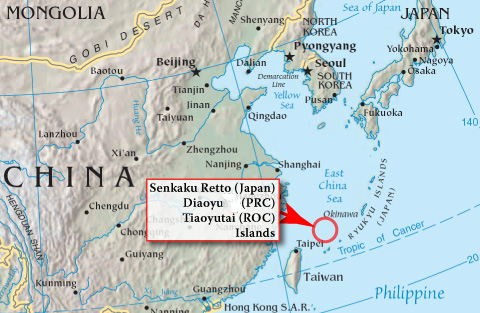T he sweep of history misses the occasional fur-ball like the seven square kilometres of islands central to the current Sino-Japanese naval confrontation over fishery and resource claims by Japan and both Chinas.
he sweep of history misses the occasional fur-ball like the seven square kilometres of islands central to the current Sino-Japanese naval confrontation over fishery and resource claims by Japan and both Chinas.
There have been a number of activist flag raisings and Coast Guard cutter scrapes among the three claimants to these isolated, uninhabited islands in the East China Sea. It’s a puzzle and there are American fingerprints on whatever ambiguity underlies the dispute, unfortunately, considering the Potsdam Declaration, the Japanese Instrument of Surrender and the United States post-war civil administration of the Ryukyu Islands.
The US is basically committed to backing Japan’s claim, having tacitly handed them as “Ryuku islands” back to Japanese control in 1972. But the Chinese claim also arises through US international agreements. The Potsdam Declaration while not a treaty was co-authored by Chiang Kai-shek and stated, “Japanese sovereignty shall be limited to the islands of Honshū, Hokkaidō, Kyūshū, Shikoku and such minor islands as we determine.” This leads us for further clarification to the Cairo Communique of December, 1943:
It is [the Three Great Allies’] purpose that Japan shall be stripped of all the islands in the Pacific which she has seized or occupied since the beginning of the first World War in 1914, and that all the territories Japan has stolen from the Chinese, such as Manchuria, Formosa, and The Pescadores, shall be restored to the Republic of China. Japan will also be expelled from all other territories which she has taken by violence and greed.Cairo Communique National Diet Library
The Potsdam Declaration, but not the earlier Cairo Communique, is clearly cited in the Japanese Instrument of Surrender. China, who claims them historically, theoretically ceded them along with the Pescadores and Taiwan under the Treaty of Shimonoseki after defeat in the First Sino-Japanese war of 1895.
So you pick. If you wondered recently why China started building an aircraft carrier these maritime and territorial contests with her coastal and island neighbours are probably your answer; imperial China was comprehensively mugged by various naval and colonial powers in the course of her decline.
Sooner or later the People’s Navy is not going to show up with a flotilla of fisheries enforcement vessels; probably around the time a populist nationalism starts to preoccupy their middle class. Japan also is showing symptoms of nationalist activism and one of the government’s justifications for buying the remaining privately-owned islands and provoking this “incident” is to keep them out of the busy hands of their nationalistic political opponents for everybody’s sake.
Curiously, the People’s Republic of China supports the claim of the Republic of China in their de facto role as the provincial authority of Taiwan, then claims national sovereignty over them in turn; to be true to their Reagan-era policies one supposes the Right should be supporting Taiwan’s claim against all comers.
16 comments